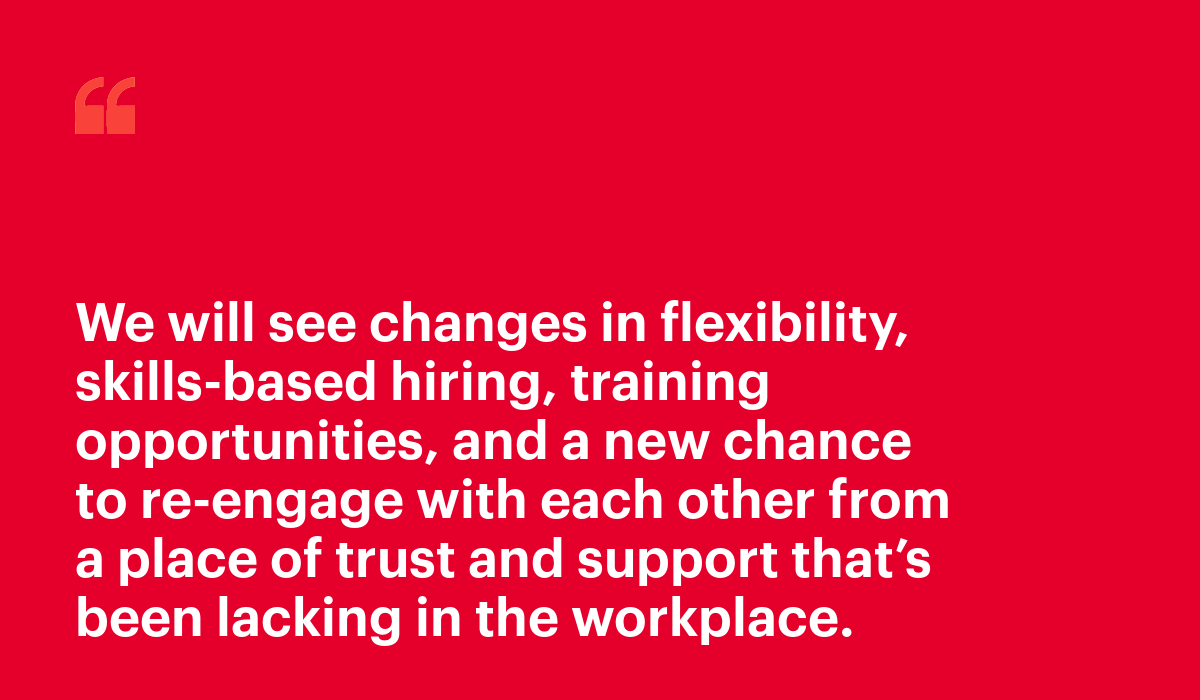What’s Really Causing the Great Resignation?
What does “the Great Resignation” mean and what are its causes? Read a round up of different media takes on this subject.

Much has been written about the “Resignation Wave” that started eroding the shores of the labor force in late spring of 2021. Visier even predicted it. Employees wanted more, wanted better, and after a protracted period of “sitting tight,” stagnating through months of stress and chaos, they were ready to make changes happen for themselves. If they couldn’t be in control of a havoc-wreaking virus taking over life as they know it, at least they could take control of their work life.
But is this really about people taking control of their lives as a result of trauma? Did the pandemic just give people a chance to really think about how much they hated their jobs? Or has this storm been brewing for a long time and 2021 was just the year “The Big Quit” finally hit?
Not everyone seems in agreement about what’s happening, though clearly something is. One thing is certain: with all the speculation about its causes, we’re at a point where it’s time to apply some Media Literacy 101 and scrutinize the myriad claims. Here’s what the media is saying:
The COVID pandemic caused work-life epiphanies
Some believe that the resignation wave is actually a result of people having a traumatic response to the stresses of the COVID-19 pandemic. People are re-evaluating their relationship to work in the broader context of their lives.
According to Wired, while “The Great Resignation” was a catchy term, it misses the point. “The real takeaway is why people are leaving their jobs in the first place—rampant stress, the shift to remote work, a forced reckoning with what matters in light of the pandemic—and what resigning is leading them to do next.”
CNBC agrees with the long-term unhappiness theory, quoting a young worker who made a career shift. “The jobs I was doing were soul-crushing work,” said Sara Adamski, who had spent the last several years working in the hospitality industry. “The pandemic woke me up to that. I started questioning why I started doing that to myself.”
Employees are disengaged and discontent
“The Great Resignation is really the Great Discontent,” says Gallup, citing their data which shows “it’s not an industry, role or pay issue. It’s a workplace issue – because the highest quit rate is among not engaged and actively disengaged workers.” While Gallup doesn’t speculate on the cause of this disengagement, they propose the best ones to solve it are managers.
While the causes of the Great Resignation are varied, the fact that people are leaving their jobs has caused a snowball effect, according to the Seattle Times, “The experience of the pandemic may have led many workers to explore opportunities they wouldn’t have looked at previously.” This may be one of the upsides of the pandemic, according to the Seattle Times. “… many workers who should have quit their lousy jobs in, say, 2019, but didn’t because they weren’t really considering the alternatives.”
It’s a pivotal movement for labor relations
Several media sources herald “The Great Resignation” as the wake up call that the labor force needs to make much-needed changes and improvements that we’ve needed for a while. “This is a once-in-a-generation ‘take this job and shove it’ moment – which gives workers an upper hand,” The Guardian asserts, insisting that it’s high time workers used this opportunity to demand better hours, pay and work-life balance. They propose that women and people of color should institute a “slow up” to demand a more human work-life balance that includes time for rest.
“This level of quitting is really an expression of optimism that says, We can do better.” according to The Atlantic. Crises of any kind have a tendency to change society, and The Atlantic ebulliently proposes that the workplace shifts caused by the pandemic are going to change America for the better, increasing innovation. Everyone quitting and starting businesses has gotten our mojo back, which will eventually lead to better jobs for everyone.
“This pivotal moment in history is taking the workforce in a positive direction,” according to Forbes. We will see changes in flexibility, skills-based hiring, training opportunities, and a new chance to re-engage with each other from a place of trust and support that’s been lacking in the workplace.

No, it’s not that clear cut
“There may not be as many workers resigning as we think, and perhaps not for the reasons we believe,” according to the BBC. The number of people quitting is 3%, not 30%, and much of the hype is around people who are thinking of quitting their jobs rather than those who actually are.
Even with the resignations we know about, the pandemic may not be the main cause. A significant portion of the resignations happen in the food service and leisure industries, which historically have high turnover. Service industry workers might be quitting out of desperation.
“It’s tempting to trumpet the Great Resignation as a sweeping event that will uniformly change labour conditions. But because the factors driving resignations are so different, if changes do come, they’ll likely look different depending on the sector and the types of jobs.”
Some think the level of resignations are overblown. “People are quitting jobs. Just not 95% of them” according to Claro. Many people say they’re planning to quit, but intent is not action and resignation rates are a fraction of the rates of people who state they want to quit. Not all of that discontentment leads to action.
How employers should react
“Right now, many organizations are making hasty and possibly irrational decisions based on perception, fear, and intent-based surveys, which only tell a fraction of the story,” according to Claro. Instead of panicking, they advise sourcing good data about what’s happening in your industry and in your own organization. Not every industry is behaving in the same way. Employers looking for software developers aren’t going to be served by trends in the food service industry and vice versa. “If employers, or we as a society, want to make smart decisions on how to respond to the �‘Great Resignation,’ we need to inform our decisions with real-time, action-based data.
On the Outsmart blog, we write about workforce-related topics like what makes a good manager, how to reduce employee turnover, and employee burnout. We also report on trending topics like the Great Resignation and preparing for a recession, and advise on HR best practices like how to present headcount data to your CEO, metrics every CHRO should track, and connecting people data to business data. But if you really want to know the bread and butter of Visier, read our post about the benefits of people analytics.


